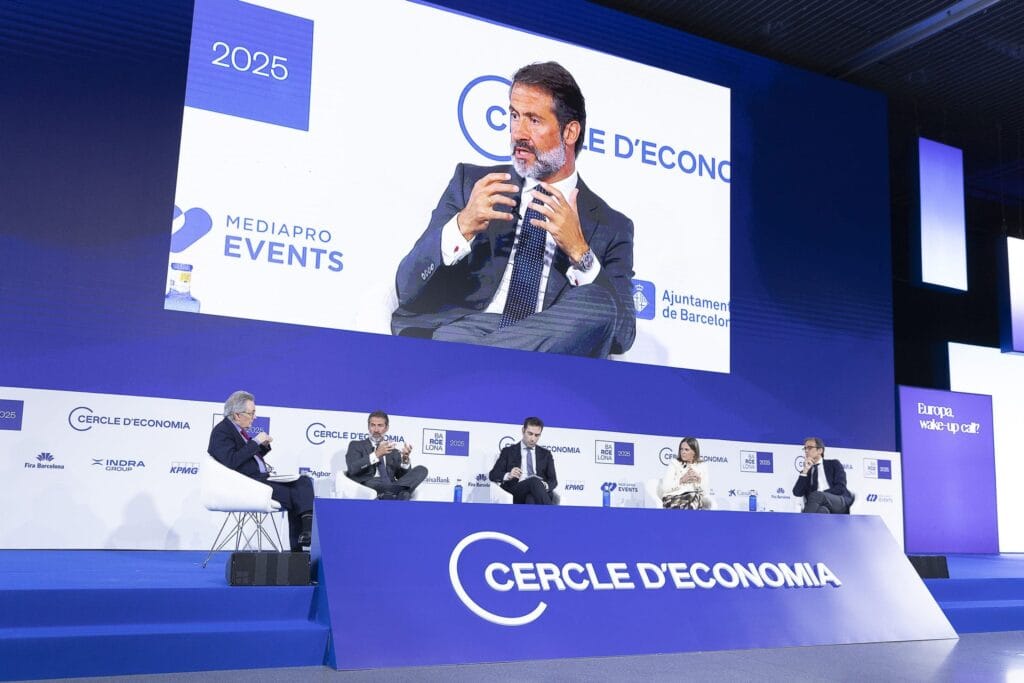In a context marked by geopolitical uncertainty and increasing economic protectionism, Spain and Europe face an urgent need to redefine their growth model. This was one of the main conclusions of the forum “Perspectives of the Spanish Economy: Towards a New Growth Model?”, held at the Cercle d’Economia in Barcelona, featuring participants such as the Minister of Economy, Carlos Cuerpo; the president of KPMG Spain, Juanjo Cano; the president of Farmaindustria, Fina Lladós; and the president of Mat Holding, Pau Relat.
The participants agreed that the current scenario compels European economies to act as a united bloc, decisively investing in high value-added sectors such as technological innovation, sustainability, and talent development.
“Europe must sit at the table with the great powers. We are a market of 450 million consumers and can no longer act like herbivores in a world of carnivores,” asserted Minister Carlos Cuerpo emphatically.
The Transfer of Innovation: An Ongoing Challenge
One focal point of the discussion was Europe’s difficulty in converting its robust research ecosystem into marketable products and services within its borders. The Draghi report, cited during the meeting, points to a lack of funding and regulatory complexity as the main brakes on the growth of European startups and “unicorns.”
“Europe has no shortage of ideas; what it lacks is a clear vision regarding strategic sectors and an environment that facilitates the transfer of innovation to the market,” stated Fina Lladós, president of Farmaindustria.
In this sense, the speakers warned about the increasing migration of European startups to the United States in search of a more favorable environment, calling for a European framework that prioritizes forward-looking investment and tolerance for failure.
Training and Talent Amid the Rise of Generative AI
Another highlighted challenge was the gap between the educational system and the needs of the business fabric. According to Juanjo Cano, president of KPMG in Spain, the rise of technologies like Generative Artificial Intelligence has accelerated the transformation of labor skills, compelling companies to take on an increasing share of employee training.
“With the emergence of Generative AI, everything is moving even faster. This is the most abrupt transformation we will experience, and we must be prepared,” Cano warned.
There was an insistence on the need to reform vocational and university training so that new profiles arrive prepared for a landscape marked by innovation and internationalization.
Tariff Impact and Geopolitics
The new tariff policy of the United States also focused much of the analysis. Juanjo Cano pointed out that slowdowns are being detected in mergers and acquisitions (M&A) activity, a good thermometer of investor confidence, due to the growing complexity of the scenarios to be evaluated.
“This is a year with many operations under review, but many are in ‘wait and see’ mode. The uncertainty is palpable,” Cano said.
In this framework, business leaders advocated for moderation, pragmatism, and the need to forge new strategic alliances, such as the treaty with Mercosur, whose ratification is expected by the end of the year.
Regulatory Simplification as a Driver of Competitiveness
One of the most repeated messages during the forum was the urgency of simplifying the European regulatory environment, especially for small and medium-sized enterprises, the most vulnerable in unstable scenarios.
“Europe legislates with a mindset of perfection that can undermine competitiveness. We need regulation, yes, but also ease and simplification,” Fina Lladós reiterated.
The Letta report, set to be presented in 2024, proposes a “EU-28” system that allows companies to navigate the current regulatory hurdles, offering a more agile parallel route to access the common market.
Collaboration, Coherence, and Trust
In conclusion, forum participants agreed on three key words for building a new growth model: collaboration, coherence, and trust. They urged for strengthened public-private collaboration, better integration of European economic policies, and the provision of adequate infrastructure that allows companies to develop high value-added productive models.
“There is no single magical measure. Institutions must generate trust and be agile in an environment of global competition and constant change,” asserted Minister Carlos Cuerpo.
The reflection from the Cercle d’Economia makes it clear that Europe and Spain have a window of opportunity but also face a significant challenge: transforming to remain competitive in a world that does not wait.
via: KPMG Trends

